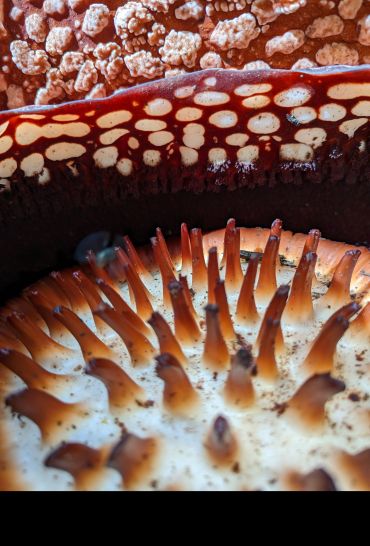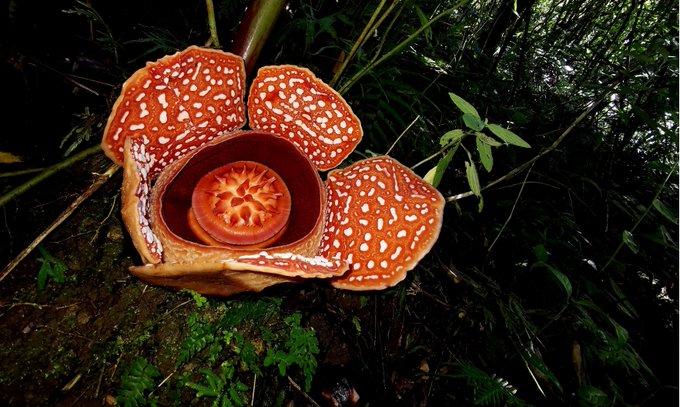Researchers issue urgent call to save the world’s largest flower -Rafflesia – from extinction
An international group of scientists, including botanists at the University of Oxford’s Botanic Garden, has issued an urgent call for coordinated action to save the iconic genus Rafflesia, which contains the world’s largest flowers. This follows a new study published this week which found that most of the 42 species are severely threatened, yet just one of these is listed in the International Union for Conservation of Nature (IUCN)’s Red List of Threatened Species. Furthermore, over two thirds (67%) of the plants’ habitats are unprotected and at risk of destruction.
Rafflesia, one of the greatest botanical enigmas, has aroused curiosity among scientists for centuries. The plant is a parasite that infects tropical vines in jungles across Southeast Asia (Brunei, Indonesia, Malaysia, the Philippines, and Thailand). For most of its lifecycle, Rafflesia is hidden from sight, existing as a system of thread-like filaments that invades its host. At unpredictable intervals, the parasite produces a cabbage-like bud that breaks through the vine’s bark and eventually forms a giant, five-lobed flower, up to a metre across. This produces a foul scent of rotting meat to attract pollinating flies, earning it the alternative name ‘corpse flower.’
With such an elusive lifecycle, Rafflesia remains poorly understood, and new species are still being recorded. To better understand the vulnerability of these unique plants, a group of scientists established the first coordinated global network to assess the threats facing Rafflesia.
The results of the study found that all 42 Rafflesia species are under threat: based on the criteria used by the IUCN, the scientists classified 25 as ‘Critically Endangered’, 15 as ‘Endangered’, and two as ‘Vulnerable’. Furthermore, over two-thirds (67%) are unprotected by regional or national conservation strategies.
Rafflesia species often have highly restricted distributions, making them particularly vulnerable to habitat destruction. The study found that many of the remaining populations contain only a few individuals located in unprotected areas at critical risk of conversion for agriculture. Since attempts to propagate Rafflesia in botanic gardens have had limited success so far, this makes habitat conservation an urgent priority.
To address these threats, the researchers recommend that all Rafflesia species are immediately added to the IUCN Red List of Threatened Species. Currently just one is listed: Rafflesia magnifica.
The team propose a four-point action plan for governments, research centres, and conservation organisations:
- Greater protection of Rafflesia habitats, targeting populations most at risk. Habitat protection was identified as the single best tool for Rafflesia conservation. Southeast Asia has the fastest disappearing forests on the planet, and many of the known Rafflesia populations are perilously close to growing human settlements.
- Better understanding of the full diversity of Rafflesia that exists, to inform decision-making. It is thought that Rafflesia species still remain undocumented, while others have gone extinct before they were even known to science. We cannot protect what we do not know to exist, so sampling expeditions and genetic analyses are required to understand how many Rafflesia species there really are.
- Develop methods to successfully propagate Rafflesia outside their native habitat. These could include grafting Rafflesia-infected vines onto uninfected vines for species where habitat destruction is likely.
- Introduce new ecotourism initiatives to engage local communities in Rafflesia conservation. Providing funding and training for local specialist guides would be an effective way to help protect local Rafflesia populations and raise awareness of the need for conservation.
Despite the challenges, the study also highlighted valuable success stories that could offer important insights for Rafflesia conservation elsewhere. For instance:

- Bogor Botanic Garden in West Java, Indonesia, has become a centre of excellence for Rafflesia propagation, after a series of successful blooming events, including 16 for the species Rafflesia patma. Knowledge-sharing activities would help spread best practices to regions where this is needed urgently.
- In West Sumatra, groups of local villagers are benefitting from Rafflesia ecotourism by forming ‘pokdarwis’: tourism awareness groups linked to social media. Many of these announce Rafflesia blooming events on social media platforms to build awareness of populations, and to attract paying tourists while carefully managing the risks of, for example, trampling. These activities could be developed as a template to disseminate to areas where community involvement with Rafflesia conservation is scarce.
Dr Chris Thorogood, Deputy Director of the University of Oxford Botanic Garden and an author of the study said: ‘This new study highlights how the global conservation efforts geared towards plants – however iconic – have lagged behind those of animals. We urgently need a joined-up, cross-regional approach to save some of the world’s most remarkable flowers, most of which are now on the brink of being lost.’
Adriane Tobias, forester from the Philippines said: ‘Indigenous peoples are some of the best guardians of our forests, and Rafflesia conservation programmes are far more likely to be successful if they engage local communities. Rafflesia has the potential to be a new icon for conservation in the Asian tropics.’
The study ‘Most of the world’s largest flowers (genus Rafflesia) are now on the brink of extinction’ has been published in Plants, People, Planet.


Comments are closed.